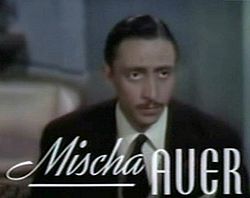Mischa Auer
| Mischa Auer | |
|---|---|

from the trailer for the film Sweethearts (1938).
|
|
| Born |
Mischa Ounskowsky 17 November 1905 St. Petersburg, Russia |
| Died | 5 March 1967 (aged 61) Rome, Italy |
| Years active | 1928-1967 |
| Spouse(s) | Norma Tillman (1931-1941) (divorced) 2 children Joyce Hunter (1941-1950) (divorced) Susanne Kalish (1950-1957) (divorced) 2 children Elsie Souls Lee (1965-1967) (his death) |
| Children | Anthony Tillman Zoe Tillman Mischa Auer Jr. |
Mischa Auer (17 November 1905 – 5 March 1967) was a Russian-born American actor who moved to Hollywood in the late 1920s. He first appeared in film in 1928. Auer had a long career playing in many of the era's best known films, and he received an Academy Award nomination in 1936. He later moved into television and acted in films again in France and Italy well into the 1960s.
Auer was born Mikhail Semyonovich Unskovsky (Михаил Семёнович Унсковский) in St. Petersburg, Russia. His name is usually seen as Mischa Ounskowsky, Mischa being the German transliteration of Misha (the diminutive form of Mikhail), and Ounskowsky being the French transliteration of his surname. Auer's parents were a Russian naval officer and the daughter of Hungarian-born Jewish violinist Leopold Auer and his wife, Nadine Pelikan. His father died when he was three, and he was taken in by his grandfather. Leopold Auer emigrated to the United States after the Russian Revolution. Mischa Auer and his mother became separated, but were reunited during the Russian Civil War. She, however, died of typhus. Auer was able to contact his grandfather, who brought the teenager to the United States.
He began performing on the stage in the 1920s in Bertha Kalich's Thalia Yiddish Theater, then moved to Hollywood, where he first appeared in 1928 in Something Always Happens. He appeared in several small, mostly uncredited roles into the 1930s, appearing in such films as Rasputin and the Empress, Viva Villa!, The Yellow Ticket, the George Gershwin musical Delicious, the Paramount Pictures all-star revue Paramount on Parade and The Lives of a Bengal Lancer.
...
Wikipedia
